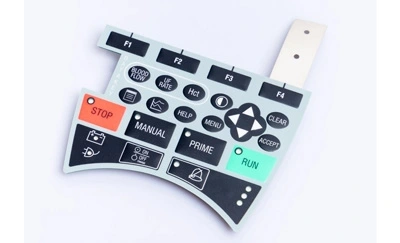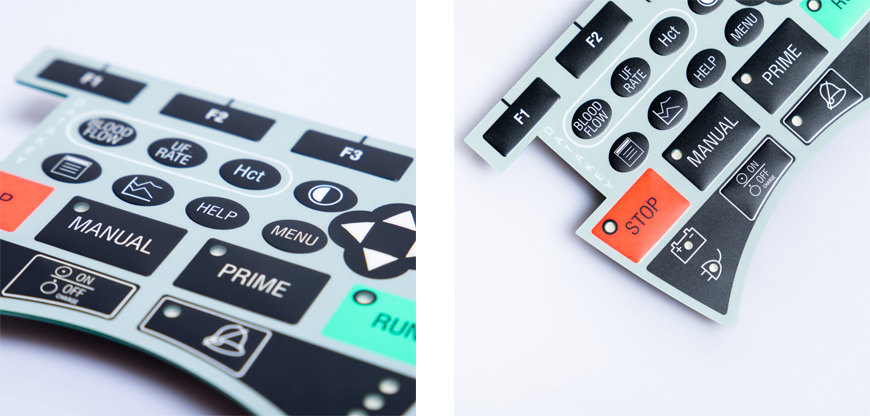
In today's fast-paced world, technology plays a pivotal role in our daily lives. From smartphones to industrial machinery, one common component that we often overlook is the membrane switch keypad. These keypads are found in various applications, including medical devices, aerospace, automotive, and consumer electronics. In this comprehensive guide, we will explore the world of customized membrane switch keypads, delving into their design, applications, benefits, and customization options.

Before we dive into customization, it's essential to understand what membrane switch keypads are. They are user interfaces that consist of thin, flexible layers of materials. These layers typically include a graphic overlay, a spacer, and a circuit layer. Membrane switch keypads are designed to provide a tactile and responsive interface for users to interact with electronic devices.
Let's break down the layers of a typical membrane switch keypad:
Graphic Overlay: This is the top layer of the keypad, featuring the key labels and graphics. It provides a protective barrier for the underlying layers.
Spacer: The spacer layer separates the graphic overlay from the circuit layer. It creates a gap that is crucial for the keypad's tactile feedback.
Circuit Layer: The circuit layer contains conductive traces that register key presses. When you press a key on the overlay, it makes contact with the circuit layer, completing the circuit and sending a signal to the device.
Customized membrane switch keypads find applications in various industries due to their versatility and reliability. Some notable applications include:
1. Medical Devices
In the medical field, hygiene and precision are paramount. Customized membrane switch keypads are used in medical devices such as infusion pumps, patient monitors, and diagnostic equipment. Their smooth, easy-to-clean surfaces make them ideal for sterile environments.
2. Aerospace
Aerospace applications demand durability and resistance to harsh conditions. Membrane switch keypads are found in cockpit controls, avionics, and communication systems, where they excel in providing consistent performance.
3. Automotive
Customized keypads are integral to modern automotive interiors, offering tactile feedback for infotainment systems, climate control, and vehicle diagnostics.
4. Consumer Electronics
From remote controls to microwave ovens, customized membrane switch keypads are ubiquitous in consumer electronics. They are cost-effective and can be designed to match the aesthetics of the product.
Customization is a key feature of membrane switch keypads. Here are some benefits:
1. Branding and Aesthetics
Custom keypads can be designed to reflect a brand's identity and enhance the overall product aesthetics. They offer opportunities for unique color schemes, logos, and branding elements.
2. User Experience
Tailoring the keypad layout and tactile feedback to the specific application can improve the user experience. Whether it's a soft touch or a firm click, customization can enhance usability.
3. Durability
Customized keypads can be engineered to withstand harsh environments, including extreme temperatures, moisture, and chemicals. This durability ensures long-term functionality.
Now that we've explored the benefits, let's look at the steps involved in customizing a membrane switch keypad:
1. Design Consultation
Begin by consulting with a membrane keypad manufacturer. Discuss your project requirements, including size, shape, color, and functionality. Their expertise will guide the design process.
2. Material Selection
Choose the materials that suit your application best. Consider factors like UV resistance, chemical resistance, and environmental conditions.
3. Graphic Overlay
Work on the graphic overlay design, incorporating your brand's visuals and key labels. Ensure clarity and durability in the graphics.
4. Tactile Feedback
Decide on the desired tactile feedback. Membrane keypads can offer various responses, from soft and quiet to firm and audible.
5. Testing and Prototyping
Before mass production, request prototypes for testing. This step ensures that the customized keypad meets your expectations.
Customized membrane switch keypads are integral to numerous industries, enhancing user experiences and product functionality. Their versatility, durability, and customization options make them a valuable component in various applications.
If you're looking to elevate your product's interface and functionality, consider investing in customized membrane switch keypads. Contact a reputable manufacturer to discuss your project and take the first step toward creating a memorable user experience.
1. Are customized membrane switch keypads more expensive than standard ones?
Customized keypads may have a slightly higher initial cost due to the customization process, but they offer long-term benefits in terms of branding and functionality.
2. Can customized keypads withstand extreme temperatures?
Yes, customized membrane switch keypads can be engineered to withstand extreme temperatures, making them suitable for a wide range of applications.
3. How long does it take to design and manufacture a customized membrane switch keypad?
The timeline for customization varies depending on the complexity of the design and the manufacturer's capabilities. It's best to consult with the manufacturer for a more accurate estimate.
4. Are membrane switch keypads easy to clean and maintain?
Yes, membrane switch keypads are easy to clean and maintain, making them ideal for applications where hygiene is essential, such as in the medical field.
5. Can I get a customized keypad that matches my product's color scheme?
Absolutely. Customized keypads can be designed to match your product's color scheme, enhancing the overall aesthetics and branding.